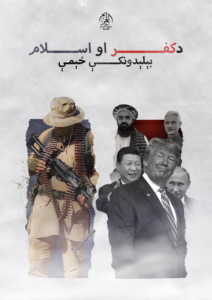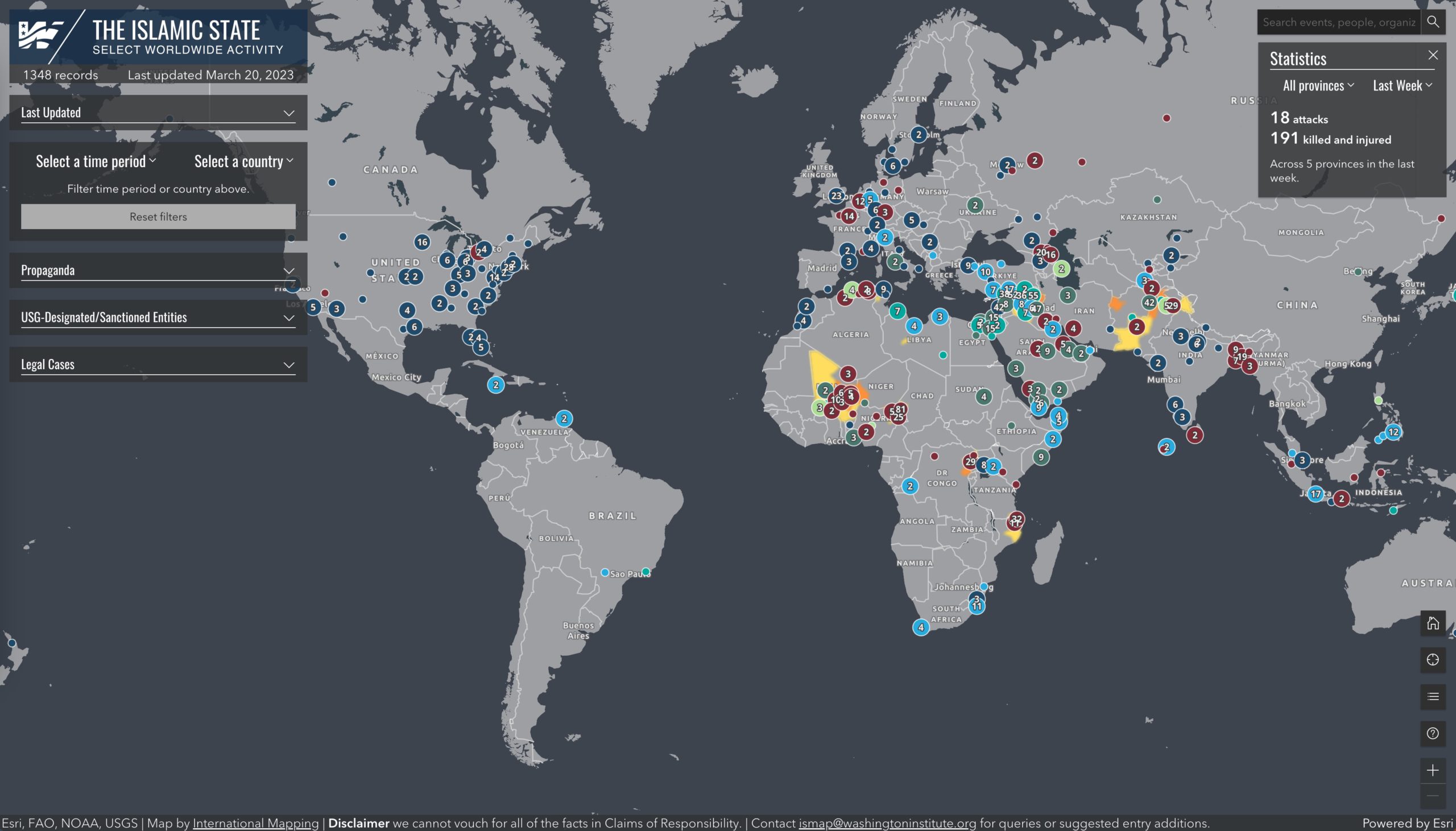New release from Firqat al-Ghurabā’: “On Operation Against The Group In Ḥārim”

Click the following link for a safe PDF copy: Firqat al-Ghurabā’ — On Operation Against The Group In Ḥarim
______________
Source: Telegram
To inquire about a translation for this statement for a fee email: [email protected]
New video nashīd from al-Qā’idah in the Arabian Peninsula: “Have the Arabs Died, O People, In Its Lands?”
_________________
Source: Telegram
To inquire about a translation for this video nashīd for a fee email: [email protected]
New statement from al-Qā’idah in the Arabian Peninsula: “Support of Our Faithful Prophet”

Click the following link for a safe PDF copy: al-Qā’idah in the Arabian Peninsula — Support of Our Faithful Prophet
_________________
Source: Telegram
To inquire about a translation for this statement for a fee email: [email protected]
New release from Dr. ‘Abd Allah bin Muḥammad al-Muḥaysinī: “Messages To the Builders of the Syrian State #5″
—
من ابتُلي بخدمة الناس وُضع بين يديه مالٌ ليس له، وأدوات ليست ملكه، وإنما هي أمانة في عنقه، يُختبر بها صدقه وتقواه. فالمال العام قوام الأمة، ومن عبث به فقد مدّ يده إلى حق الملايين ..
وقد قال النبي ﷺ محذرًا:
«إن رجالًا يتخوَّضون في مال الله بغير حق، فلهم النار يوم القيامة»
رواه البخاري.
فيا من وُلِّيت أمرًا من أمور الأمة، لا تجعل منصبك مطيةً لمصلحةٍ خاصة، ولا تستحل ما ليس لك بحجة التسهيل أو العرف أو أنها “أشياء بسيطة”.
فالحرام حرام وإن صَغُر، والأمانة عظيمة وإن خَفِيت.
المال العام لا يُستباح، ولا يُستخدم إلا لمصلحة عامة.
فإن اضطُر المرء إلى الانتفاع بشيء منه، فليستأذن، وليكن أمينًا، ولْيعلم أن الله مطّلع عليه، ومن عود نفسه الورع في الصغائر هان عليه اتقاء الكبائر ..
________________
To inquire about a translation for this release for a fee email: [email protected]
New release from Dr. ‘Abd Allah bin Muḥammad al-Muḥaysinī: “Messages To the Builders of the Syrian State #4″
—
في حديث صادق مع أحد رفقاء الدرب، شبَّه المرحلة التي نمر بها اليوم بـ مرحلة جبل الرماة يوم أحد… تلك اللحظة التي ظنّ فيها الرماة أن المعركة انتهت وأن النصر قد حُسم، فترك بعضهم مواقعهم طلبًا للغنيمة، فتبدّل النصر إلى هزيمة والتمكين إلى ابتلاء.
تأملت هذا المثال العميق، ثم وقفت عند قول الله تعالى مخاطبًا أهل الرماة:
﴿وَلَقَدْ صَدَقَكُمُ اللَّهُ وَعْدَهُ إِذْ تَحُسُّونَهُم بِإِذْنِهِ حَتَّىٰ إِذَا فَشِلْتُمْ وَتَنَازَعْتُمْ فِي الْأَمْرِ وَعَصَيْتُم مِّن بَعْدِ مَا أَرَاكُم مَّا تُحِبُّونَ﴾
[آل عمران: 152]
كم تشبه حالنا اليوم ذلك الموقف! نصر يلوح وتمكين يقترب، لكن فتنة الدنيا تكاد تسرق البركة من الطريق… النزاع، ضعف النية، الالتفات لزهرة الحياة، الشعور بأن الطريق انتهى قبل أن ينتهي فعلًا… كل ذلك فتنة أخطر من فتن السلاح والمعارك.
لهذا كانت همستي لنفسي أولًا، ثم لإخواني:
اثبتوا على الجبل…
أخلصوا النيّة…
لا تبيعوا الآخرة بثمن لحظي…
فوالله ما كُسرت أمة من خارجها قط، إنما تُكسر يوم تفشل ويوم تتنازع ويوم تعصي أمر ربها
_____________
Source: Telegram
To inquire about a translation for this release for a fee email: [email protected]
New article from The Islamic State’s Wilāyat Khurāsān: “The Divided Tents of Disbelief and Islām!”

Click the following link for a safe PDF copy: The Islamic State’s Wilāyat Khurāsān — The Divided Tents of Disbelief and Islām!
________________
Source: RocketChat
New issue of The Islamic State’s newsletter: “al-Nabā’ #517″
—

Click the following link for a safe PDF copy: The Islamic State — al-Nabā’ Newsletter #517
_______________
Source: RocketChat
To inquire about a translation for this newsletter issue for a fee email: [email protected]
GUEST POST: Who Are Nigeria’s “Newest” Jihadist Militants?
Jihadology aims to not only provide primary sources for researchers and occasional analysis of them, but also to allow other young and upcoming students as well as established academics or policy researchers to contribute original analysis on issues related to jihadism. If you would like to contribute a piece, please email your idea/post to azelin [at] jihadology [dot] net.
Click here to see an archive of all guest posts.
—
=&0=&
By James Barnett and Vincent Foucher
In November 2024, Nigerian military officials declared with some alarm that a “new” terrorist group known as “Lakurawa” was operating in rural corners of the country’s northwest. Several months later, in January 2025, the Nigerian government took the step to legally designate Lakurawa as terrorists. Soon after, the military junta in Niger alleged (without evidence) that the group had been sponsored by Nigeria in the latest iteration of a now two-year-long spat between the neighboring countries.
The emergence of a supposedly new militant group on Nigerian soil is particularly worrying against a backdrop of jihadist violence once again escalating in the country’s northeast and spreading to other regions of Nigeria. Yet the identity of these militants has been difficult to parse, with significantly divergent views being presented in different media reports, official statements, and publications by analysts. As with many things related to jihadism in Nigeria, there is much analysis that relies on limited hard data, resulting in significant speculation.
Having researched the Lakurawa phenomenon before it made international headlines, we aim to offer some essential context as well as a discussion of the evidence in support of two competing theories regarding Lakurawa’s affiliation. We propose that Lakurawa, while it initially applied to a specific group of jihadist fighters recruited from the Sahel-Saharian zone to fight bandits in Sokoto state, has now become a generic exo-descriptor which civilians in northern Nigeria (and, by extension, many officials, journalists, and analysts) use to describe a variety of jihadist militants originating from the Sahel-Saharian zone (and their associates) now in different parts of Northwest Nigeria. Thus, our evidence suggests that the term is being used to describe both members of the Islamic State Sahel Province (ISSP, formerly known as the Islamic State in Greater Sahara or ISGS), who are particularly active in Sokoto state and parts of neighboring Kebbi state, as well as members of Jama’at Nasr al-Islam wal-Muslimeen (JNIM, the al-Qaeda-affiliated Sahelian network) that are active along the Benin-Nigeria border. Each group’s area of operations within Nigeria is somewhat vague at this stage, which leads to confusion in parts of the northwest where they might overlap, a confusion which benefits the jihadists. The media’s fixation on Lakurawa seems to have reinforced perceptions within the northwest that they are a single group and the principal cause of regional instability, resulting in local media and analysts likely misattributing bandit attacks to Lakurawa on several occasions since late last year, as a forthcoming study by the first author shows.
Much of the analysis of Lakurawa published to date has utilized media reports and statements from officials, which are often conflicting and have a limited empirical basis. We rely instead primarily on interviews with key sources, including jihadist defectors in Nigeria and members of communities in the northwest who have interacted with Lakurawa, in some cases quite extensively over the course of several years. These interviews are drawn from different research projects that the authors have been conducting examining the history and evolution of the Boko Haram conflict and its intersection with other forms of insecurity in Nigeria. Our methodology is imperfect, but we nonetheless believe that it can help shed light on aspects of the “Lakurawa” phenomenon that have heretofore been a source of confusion.
A brief history of Lakurawa from 2017
Traditional authorities in the northernmost parts of Sokoto state first invited the militants to offer protection to their communities in late 2017. Gudu and Tangaza LGAs of the state, which border Niger Republic, were suffering at the time an onslaught of bandits from Zamfara, who themselves were relocating to neighboring Sokoto in response to military operations against their bases. As our colleague Murtala Ahmed Rufa’i has detailed, with the Nigerian government unable to provide security to such isolated rural communities afflicted by banditry, the traditional rulers of Balle district in Gudu and Gongono district in Tangaza met with a local chairman of Miyetti Allah, a prominent pastoralist civil society group, and decided to use the latter’s connections to the Malian pastoralists to hire armed fighters from the latter to protect their communities. As explained further below, the militants who eventually came to Sokoto were a mixture of Malians and Nigeriens, however, with the latter belonging principally to the Tolobe (a Fulani clan with historical ties to Sokoto).
The district heads might not have known that these militants had some association with jihadist groups operating in Niger Republic and Mali. The militants were initially known as Lakuruje, a Hausa-ization of the French word for “recruits,” likely in reference to their being recruited from Mali and Niger to combat banditry in Nigeria. During the 1990s and 2000s, various ethnic militias had formed in Niger, including among the Tolobe, initially to fight against Touareg rebels, with some of these militias then conducting anti-banditry activities. From 2012 onward, some of these Tolobe joined the jihadist group Movement for Oneness and Jihad in West Africa (known by its French acronym, MUJAO), a splinter group of al-Qaeda in the Islamic Maghreb that eventually joined JNIM in 2017. As explained below, some of these Tolobe affiliated with MUJAO likely constituted at least a share of the early membership of Lakuruje (who soon became known instead as Lakurawa, the exact etymology of which is unclear).
The militants, for their part, invoked their kinship and historical connections to the region, including their clan’s role in the jihad led in the region by Usman Danfodio in the early 19th century. (Gudu holds significance in the history of the Sokoto Caliphate; while members of Lakurawa have attempted to exploit that history, religious leaders in Sokoto today have pushed back against the militants’ appropriation of this legacy.) In the first few months of operations in Sokoto in 2018, the militants were welcomed in the communities because of their efforts to rescue victims under bandit attack. By the end of 2018, however, the Lakurawa had shifted from merely fighting bandits and were engaging in an aggressive campaign of sharia enforcement in local villages. As residents of those communities recalled, the Lakurawa “preached in public squares, intimidated clerics, and flogged villagers for playing music or dancing,” while also “follow[ing] informal, roving Fulani settlements (ruga), forcing the herders to pay levies on their cattle under the guise of zakat (religiously obligatory almsgiving) and chastising them for ‘un-Islamic’ activities.”
This led some community members to seek help from the Sokoto state government in expelling the group. A set of indirect negotiations ensued between the government and the armed group via local traditional rulers. The challenge, however, was that Lakurawa at this stage was not
New release from Dr. ‘Abd Allah bin Muḥammad al-Muḥaysinī: “Messages To the Builders of the Syrian State #3″
—
[الذنب_بعد_النصر خطير والله
أسرع أنواع الذنوب عقوبة, ذنب يقترف بعد النصر، وأخطرها على دولة المسلمين: التنافس على الغميمة، (المادية: كغنيمة المال، والمعنوية: كالرتب والمناصب).
وبتدبر آي القرآن الكريم نقف على قصة وقعت في زمن النبي ﷺ، هذه القصة ليست مجرد حادثة تاريخية، بل هي قانون إلهي ثابت: وهو أن النصر حليف القلوب الموحدة المتعلقة بالله، وليس الأيدي الممتلئة بالدنيا. إنه ثمرة الانضباط والثبات على المبدأ، حتى عندما تلمع مغريات الحياة.
قال تعالى: { وَعَصَيْتُم مِّن بَعْدِ مَا أَرَاكُم مَّا تُحِبُّونَ}. فهذه الآية نزلت في الذين استعجلوا جمع الغنية قبل هزيمة جيش المشركين، وفي الرماة الذين تركوا مواقعهم في “جبل أحد” وأرادوا مشاركة الغانمين في جمع الغنيمة!!
فماذا كانت النتيجة؟ هزيمة وتفرق للصف المسلم وقتل وقع في الصحب الكرام، حتى كاد أن يقتل قائد الجيش ﷺ.
فالحذر الحذر من الذنوب التي تكون بعد النصر!!
فلا تنكر فإن الأمر جد * * * وليس كما حسبت ولا ظننتا
________________
Source: Telegram
To inquire about a translation for this release for a fee email: [email protected]
New release from Shaykh ‘Abd al-Razāq al-Mahdī: “The Ruling on Congratulating Someone For a Position, Including Winning Membership In the People’s Assembly”
لا تشرع التهنئة فليس من السنة وسواء كان منصبا رفيعا كالخلافة أو دونها كالوزارة والإدارة ومجلس الشعب والقضاء..
لأن المنصب ابتلاء واختبار لصاحبه
فكيف يتم تهنئة من هو في حالة اختبار وابتلاء فهذا يدعى له بأن يقوم بأعباء ذلك فإنها مسؤولية..
قال صلى الله عليه وسلم لأبي ذر:
“يا أبا ذر إنك ضعيف، وإنها أمانة، وإنها يوم القيامة خزي وندامة، إلا من أخذها بحقها وأدى الذي عليه فيها” رواه مسلم.
قال النووي: هذا الحديث أصل عظيم في اجتناب الولايات، لا سيما لمن كان فيه ضعف عن القيام بوظائف تلك الولاية. اهـ.
وفي الصحيحين عن أبي موسى قال: قال رجلان من قومي: أمرنا يا رسول الله فقال: “إنا لا نولي هذا من سأله ولا من حرص عليه”
قال ابن حجر في الفتح: ظاهر الحديث منع تولية من يحرص على الولاية إما على سبيل التحريم أو الكراهة، ولكن يستثنى من ذلك من تعين عليه. اهـ.
فالمنصب تكليف لا تشريف وأمانة لا غنيمة ومحنة لا منحة بخلاف ما يظنه أهل الدنيا
ولذا كان سلفنا الصالح يرفضون المناصب وقصة أبي جعفر المنصور لما ارسل إلى أبي حنيفة وسفيان الثوري وشريك بن عبد الله النخعي يطلبهم لتولي القضاء فرفضوا وتم سجن أبي حنيفة وأما الثوري ففر إلى اليمن وعاش زمنا متخفيا وأما شريك فرهبوه وخوفوه فتولى القضاء.
فكتب إليه الثوري فزجره وقال: لا اكلمك حتى تترك القضاء.
ولما ولي هارون الرشيد الخلافة أرسل إلى الفضيل بن عياض ليأته وكان له منزلة عند هارون فرفض الفضيل فذهب هارون إلى بيت فضيل فقال: عظني فوعظه وكان مما قال له:
“إن عمر بن عبد العزيز لما ولي الخلافة دعا سالم بن عبد الله، ومحمد بن كعب، ورجاء بن حيوة، فقال: إني قد ابتليت بهذا البلاء، فأشيروا علي! فعد الخلافة بلاء، وعددتها أنت وأصحابك نعمة؟!
فتذكر يا صاحب المنصب أنك ستسأل عما عملت وقدمت .. فأعد لكل ذلك سؤال جوابا بين يدي العزيز الجبار..
يروى أن بعض الفضلاء عرض عليه القضاء أو الوزارة فرفض وقال:
وألذ من نيل الوزارة أن ترى
يوماً يريك مصارع الوزراء
وقال أحدهم يصف واليا بعد عزله:
تولّاها وليس له عدو
وغادرها وليس له صديق!
وقلما أفلح صاحب منصب وأدى حق الله وحق العباد! قال صلى الله عليه وسلم قال:
«إنكم سَتَحْرِصُونَ على الإِمَارَة، وستكون نَدَامَةً يوم القيامة، فَنِعْمَ المُرْضِعَةُ وَبِئْسَتِ الفَاطِمَةُ».البخاري عن أبي هريرة.
فنعم المرضعة: اي يتمتع صاحب المنصب بالمال والجاه والخدم..
وبئست الفاطمة: بعد أن يجرد من منصبه بعزل أو موت فالويل له كل الويل.
– الزجر في هذا الحديث وحديث أبي ذر مع ما ذكرنا من رفض أعلام السلف للمناصب لما كان يحكم بشرع الله! فكيف الحال هذه الأيام؟!!
تنبيه: بعض أصحاب المناصب يرى نفسه أنه على ثغر عظيم وأنه مجاهد ويجاهد!! وحقيقة الأمر أنه مسكين منغمس في المخالفات الشرعية دون أن يشعر!!
نسأل الله السلامة والعافية وأن نموت غير مبتدعين ولا مبدلين لشرع الله سبحانه وتعالى.
________________
To inquire about a translation for this release for a fee email: [email protected]

